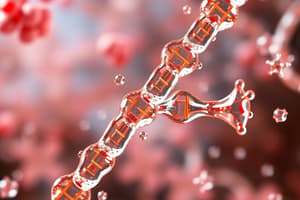Podcast
Questions and Answers
What is a catalyst?
What is a catalyst?
- A substance that slows down a chemical reaction
- A byproduct of a chemical reaction
- A type of enzyme
- A substance that increases the rate of a chemical reaction without undergoing any permanent change (correct)
What is an enzyme?
What is an enzyme?
A substance produced by a living organism that acts as a catalyst for a biochemical reaction.
What is activation energy?
What is activation energy?
The minimum quantity of energy required for a reaction to occur.
What is a substrate?
What is a substrate?
What is the active site of an enzyme?
What is the active site of an enzyme?
Polar molecules have electrical or magnetic polarity.
Polar molecules have electrical or magnetic polarity.
What is a hydrogen bond?
What is a hydrogen bond?
Study Notes
Catalysts and Enzymes
- A catalyst accelerates chemical reactions without undergoing permanent changes.
- Enzymes are specialized catalysts produced by living organisms, facilitating specific biochemical reactions.
Activation Energy
- Activation energy is the minimum energy required for reactants to initiate a chemical reaction.
Substrates
- Substrates are the specific substances on which enzymes act, underpinning the reaction process.
Active Sites
- Active sites are specific regions on enzymes where substrates bind, essential for enzyme function and reactivity.
Polarity
- Polar substances exhibit electrical or magnetic polarity, influencing interactions at the molecular level.
Hydrogen Bonds
- Hydrogen bonds are weak attractions between molecules due to electrostatic interactions between protons and electrons, playing critical roles in molecular structures.
Studying That Suits You
Use AI to generate personalized quizzes and flashcards to suit your learning preferences.
Description
This quiz covers key terms related to catalysts, enzymes, and activation energy in biological processes. Perfect for students who want to strengthen their understanding of these concepts in a straightforward way. Test your knowledge and enhance your learning today!




